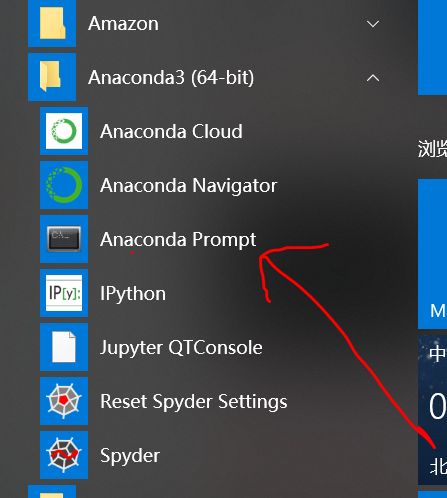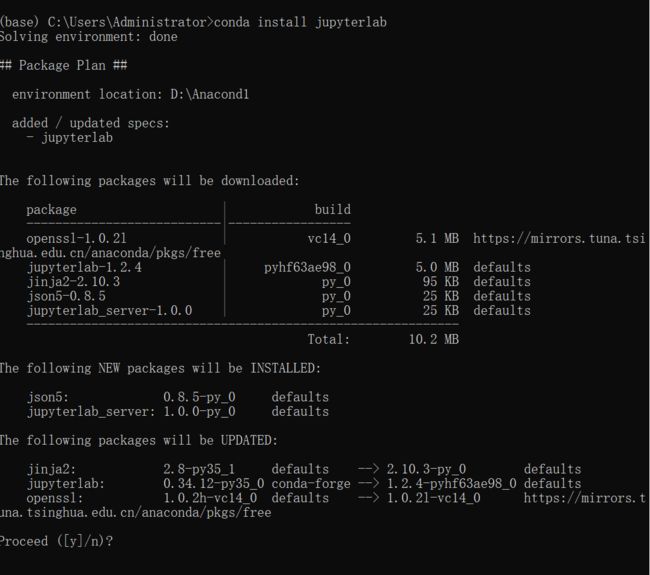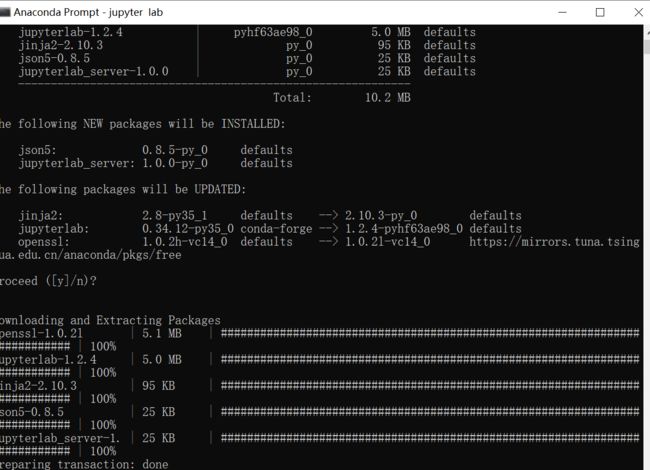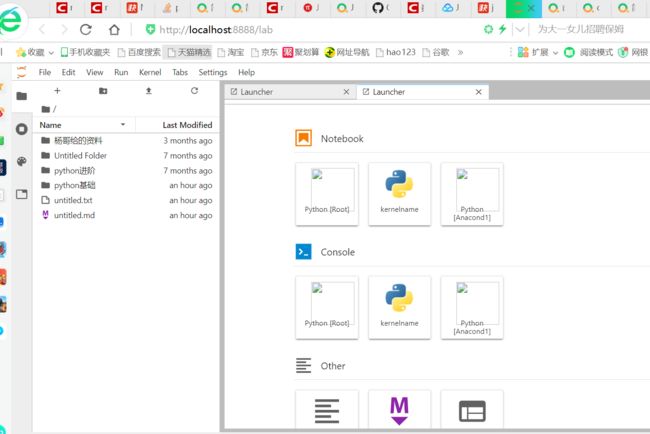Jupyter notebook 由ipython发展而来是一款集代码编辑与运行的文本编辑系统而JupyterLab是Jupyter notebook的升级版本完全兼容notebook,而且比后者功能更加强大支持多种格式文档编辑,支持多界面浏览创作,界面也更为友好,其必然会取代Jupyter notebook。
安装Jupyter Lab有两种途径
一、通过官方提供的API下载
二、种是通过Anaconda下载
本人因为安装了Anaconda组件所以直接通过的Anaconda安装的安装步骤如下:
输入之后页面lab直接在浏览器中打开截图如下:
可能需要更新Anaconda组件这是后输入下面指令就可以搞定
在API接口中直接下载可以参考我杨哥的笔记如下:
https://www.jianshu.com/p/6250324a4e20?utm_source=desktop&utm_medium=timeline
或者参考官方英文版文档如下:
Getting started
Installation
JupyterLab can be installed using conda or pip. For more detailed instructions, consult the installation guide.
Project installation instructions from the git sources are available in the contributor documentation.
conda
If you use conda, you can install it with:
conda install -c conda-forge jupyterlab
pip
If you use pip, you can install it with:
pip install jupyterlab
If installing using pip install --user, you must add the user-level bin directory to your PATH environment variable in order to launch jupyter lab.
Installing with Previous Versions of Jupyter Notebook
When using a version of Jupyter Notebook earlier than 5.3, the following command must be run after installation to enable the JupyterLab server extension:
jupyter serverextension enable --py jupyterlab --sys-prefix
Running
Start up JupyterLab using:
jupyter lab
JupyterLab will open automatically in the browser. See the documentation for additional details.
Prerequisites and Supported Browsers
Jupyter notebook version 4.3 or later is required. To check the notebook version, run the command:
jupyter notebook --version
The latest versions of the following browsers are currently known to work:
- Firefox
- Chrome
- Safari
See our documentation for additional details.
Development
Contributing
To contribute to the project, please read the contributor documentation.
JupyterLab follows the Jupyter Community Guides.
Extending JupyterLab
To start developing an extension, see the developer documentation and the API docs.
License
JupyterLab uses a shared copyright model that enables all contributors to maintain the copyright on their contributions. All code is licensed under the terms of the revised BSD license.
Team
JupyterLab is part of Project Jupyter and is developed by an open community. The maintenance team is assisted by a much larger group of contributors to JupyterLab and Project Jupyter as a whole.
JupyterLab's current maintainers are listed in alphabetical order, with affiliation, and main areas of contribution:
- Afshin Darian, Two Sigma (co-creator, application/high-level architecture, prolific contributions throughout the code base).
- Vidar T. Fauske, JPMorgan Chase (general development, extensions).
- Tim George, Cal Poly (UI/UX design, strategy, management, user needs analysis)
- Brian Granger, AWS (co-creator, strategy, vision, management, UI/UX design, architecture).
- Jason Grout, Bloomberg (co-creator, vision, general development).
- Max Klein, JPMorgan Chase (UI Package, build system, general development, extensions).
- Fernando Perez, UC Berkeley (co-creator, vision).
- Ian Rose, Quansight/City of LA (general core development, extensions).
- Saul Shanabrook, Quansight (general development, extensions)
- Steven Silvester, AWS (co-creator, release management, packaging, prolific contributions throughout the code base).
Maintainer emeritus:
- Chris Colbert, Project Jupyter (co-creator, application/low-level architecture, technical leadership, vision, PhosphorJS)
- Cameron Oelsen, Cal Poly (UI/UX design).
- Jessica Forde, Project Jupyter (demo, documentation)
This list is provided to give the reader context on who we are and how our team functions. To be listed, please submit a pull request with your information.
Getting help
We encourage you to ask questions on the Discourse forum. A question answered there can become a useful resource for others.
Please use the GitHub issues page to provide feedback or submit a bug report. To keep resolved issues self-contained, the lock bot will lock closed issues as resolved after a period of inactivity. If related discussion is still needed after an issue is locked, please open a new issue and reference the old issue.
Weekly Dev Meeting
We have videoconference meetings every week where we discuss what we have been working on and get feedback from one another.
Anyone is welcome to attend, if they would like to discuss a topic or just to listen in.
- When: Wednesdays 9AM Pacific Time
- Where:
calpoly/jupyterZoom - What: Meeting notes




